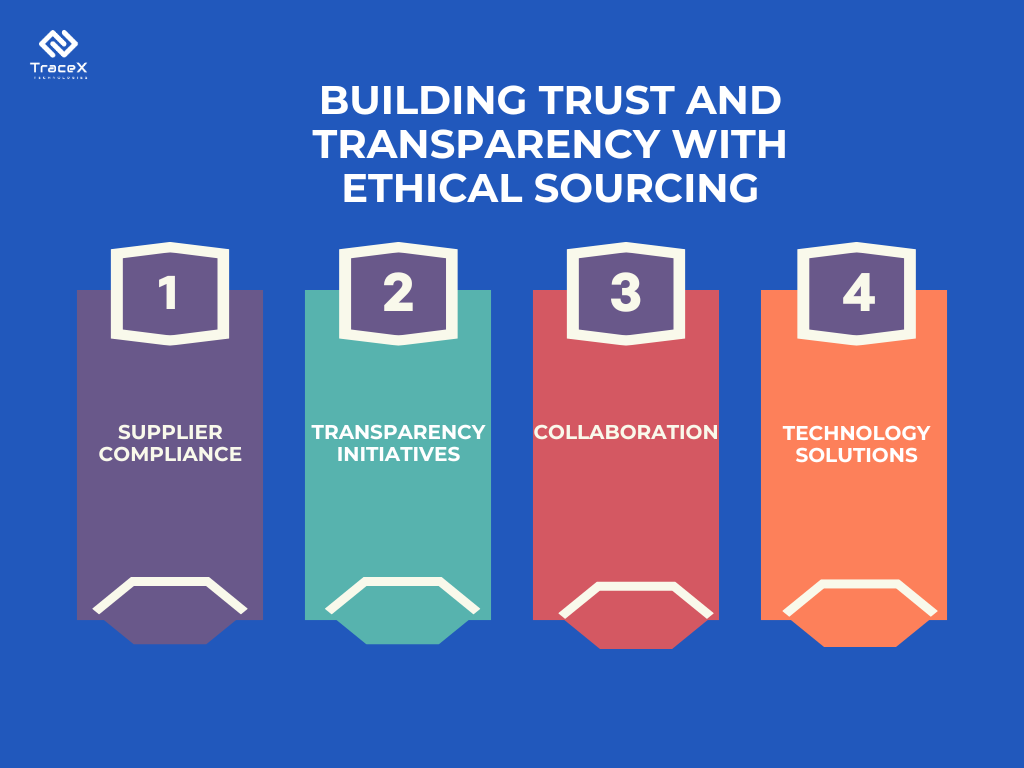Contact: +91 99725 24322 |
Menu
Menu
Quick summary: Explore the importance of ethical sourcing practices in Europe, focusing on building trust and transparency across supply chains. Learn about strategies, incentives, and policy recommendations to promote responsible sourcing and drive positive social and environmental impact.

In the heart of Europe’s bustling marketplace, a silent but crucial transformation is underway—one that champions ethical sourcing practices. As consumers become increasingly conscientious about the origins of the products they purchase, businesses are responding by prioritizing transparency and trustworthiness in their sourcing processes. This shift towards transparency not only builds consumer trust but also fosters a more sustainable and responsible supply chain ecosystem.
Ethical sourcing is a critical aspect of sustainable supply chain management. It involves procuring materials, products, and services from suppliers in a socially responsible way. By prioritizing ethical principles, organizations can ensure fair income for local communities and avoid unethical labour practices such as child labour or slavery. In the context of Europe, where global sourcing is prevalent, promoting ethical practices becomes even more crucial.
According to McKinsey, approximately 60 percent of surveyed consumers express willingness to pay a premium for products that ensure employee safety and prohibit child labor. Interestingly, this aligns with the proportion of consumers who are willing to pay extra for products with minimal packaging or crafted from recycled materials.
Ethical sourcing refers to the procurement of goods and services in a manner that upholds moral and socially responsible principles throughout the supply chain. This encompasses various factors such as fair labour practices, environmental sustainability, animal welfare, and adherence to human rights standards. Ethical sourcing entails a commitment to transparency, accountability, and integrity in sourcing practices, ensuring that products are sourced and produced in an ethical and sustainable manner.
Ethical sourcing holds significant importance in Europe, where consumers are increasingly prioritizing ethical and sustainable products. With heightened awareness of social and environmental issues, European consumers are demanding greater transparency and accountability from businesses regarding the origins of the products they purchase. Ethical sourcing practices not only align with European values of social responsibility and environmental stewardship but also contribute to building trust and loyalty among consumers. Furthermore, in an interconnected global economy, ethical sourcing helps mitigate risks related to labour exploitation, environmental degradation, and human rights violations, thereby promoting stability and sustainability in supply chains. As such, ethical sourcing has emerged as a cornerstone of responsible business conduct in Europe, driving positive social and environmental impact while meeting the evolving expectations of consumers.
Europe stands as a vibrant and diverse market characterized by a multitude of industries and consumer preferences. With a population of over 740 million people spread across 27 member states of the European Union (EU), the region boasts a significant share of global trade and consumption. The European market encompasses a wide array of sectors, including food and beverages, fashion and apparel, electronics, automotive, and pharmaceuticals, among others. Key players in the European market range from multinational corporations to small and medium-sized enterprises (SMEs), each contributing to the complex tapestry of sourcing practices in the region.
Despite its economic prosperity, the European market faces a myriad of sourcing challenges that impact businesses across industries.
Ethical considerations play a significant role in sourcing practices across Europe, reflecting growing consumer awareness and demand for responsible and sustainable products.
Transparency is paramount in fostering trust between businesses and consumers in the context of ethical sourcing. This entails providing visibility into the entire supply chain, from raw material sourcing to manufacturing, distribution, and retail. By leveraging technology such as blockchain, RFID tracking, and supply chain management software, companies can achieve greater transparency by tracing the journey of products and materials at every stage. Transparent supply chains allow for accountability and enable consumers to make informed purchasing decisions based on ethical considerations.
Collaboration is essential for promoting ethical sourcing practices throughout the supply chain. Businesses must work closely with suppliers, subcontractors, and other stakeholders to ensure alignment with ethical standards and best practices. This collaboration involves establishing clear expectations, conducting regular audits and assessments, and providing support and resources to help suppliers improve their practices. By fostering open communication and collaboration, companies can build stronger relationships with suppliers and promote a culture of ethical sourcing across the industry.
Certification and verification processes play a crucial role in validating and verifying ethical sourcing practices. Various certification schemes and standards, such as Fair Trade, Organic, and Forest Stewardship Council (FSC) certification, provide assurances to consumers that products have been sourced and produced in an ethical and sustainable manner. Companies can obtain certifications for their own operations and products, as well as require certification from suppliers and partners. Verification processes involve rigorous assessments, audits, and monitoring to ensure compliance with ethical standards and regulations.

Blockchain technology, RFID (Radio-Frequency Identification), and other digital tracking systems enable real-time monitoring and traceability of products from their origins to the end consumer. By recording every step of the supply chain on an immutable ledger, these technologies provide transparency into sourcing practices, allowing businesses and consumers to verify ethical claims and track the journey of products.
Advanced analytics, data integration platforms, and supply chain management software provide visibility into complex supply chains, enabling businesses to identify potential risks, track supplier performance, and monitor compliance with ethical standards. By aggregating data from multiple sources and analyzing key metrics, these technologies empower businesses to make informed decisions and mitigate risks associated with unethical sourcing practices.
Supplier relationship management (SRM) platforms and supplier collaboration tools facilitate communication and collaboration between businesses and their suppliers. These platforms streamline supplier onboarding, performance monitoring, and risk assessment processes, enabling businesses to vet suppliers based on ethical criteria and establish mutually beneficial relationships built on trust and transparency.
Digital certification platforms and compliance management systems automate the certification and compliance process, making it easier for businesses to verify the ethical credentials of suppliers and products. These platforms streamline the collection and verification of certification documents, track expiration dates, and provide audit trails, ensuring compliance with regulatory requirements and ethical standards.
TraceX blockchain traceability solutions revolutionize ethical sourcing practices by leveraging cutting-edge blockchain technology to establish transparency, accountability, and integrity throughout the supply chain. With TraceX, businesses can ensure that their products are sourced and produced in accordance with stringent ethical standards, including fair labor practices, environmental sustainability, and social responsibility. By recording every transaction and event on an immutable blockchain ledger, TraceX provides unparalleled transparency into complex supply chains, enabling stakeholders to trace the journey of products from origin to destination. This transparency builds trust among consumers, suppliers, and regulatory authorities, fostering a culture of responsibility and sustainability in the global marketplace. With TraceX, businesses can empower ethical sourcing practices, drive positive social and environmental impact, and build a more sustainable future for generations to come.
Education and awareness campaigns play a pivotal role in promoting ethical sourcing practices by informing consumers, businesses, and stakeholders about the importance of ethical sourcing and its impact on social, environmental, and economic sustainability. Governments, industry associations, and non-governmental organizations (NGOs) can provide incentives and support for businesses to adopt and implement ethical sourcing initiatives. This can include financial incentives, such as grants, tax breaks, or subsidies, to help offset the costs associated with ethical sourcing practices. Policymakers and organizations can advocate for policy changes and regulatory reforms to promote ethical sourcing practices at the national, regional, and international levels. This can include the development of robust regulatory frameworks, standards, and certification schemes to ensure compliance with ethical sourcing principles.
In conclusion, promoting ethical sourcing practices in Europe is essential for building trust, fostering transparency, and driving positive social, environmental, and economic impacts across supply chains. By prioritizing education and awareness campaigns, incentivizing and supporting ethical sourcing initiatives, and advocating for policy reforms, Europe can create a conducive environment for businesses to adopt and implement ethical sourcing practices effectively. Through collective action and collaboration among governments, businesses, NGOs, and consumers, Europe can strengthen its commitment to ethical sourcing, enhance consumer trust, and contribute to a more sustainable and responsible global marketplace. By embracing ethical sourcing principles, Europe can pave the way towards a future where social justice, environmental stewardship, and economic prosperity are mutually reinforcing pillars of a thriving society.
